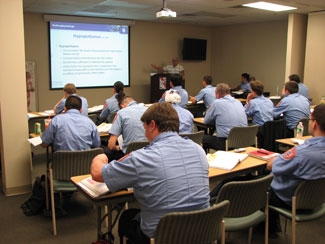Course Descriptions
EMT101- Introduction to Pre-Hospital Emergency Care
This course is designed as a comprehensive introduction to the paramedic profession and the practice of advanced medical skills in the pre-hospital treatment of the sick and injured. Through a variety of didactic and clinical experiences, students will grow in their understanding of the roles and responsibilities of a paramedic within the larger context of the emergency medical services profession. The history and development of EMS, the well-being of pre-hospital care providers, medical-legal considerations, ethics, therapeutic communications, personal and scene safety, patient assessment and other topics will be discussed. Clinically, a strong emphasis is placed on developing an assessment-based approach to patient care that leads to timely and appropriate treatment regimens and the support and sustaining of human life.
EMT110- Pre-Hospital Medical Emergencies
The major objective of this course is to provide students with an in-depth understanding of the predominant medical emergencies encountered in the pre-hospital setting. A thorough review of the human body systems, cellular biology and the principles of pathophysiology provides a foundation for recognizing and treating the signs and symptoms of acute and exacerbated chronic medical illness. Pulmonology, airway management/intubation, neurology, urology, endocrinology, toxicology and substance abuse are among the many topics that will be addressed in this course.
EMT120- Pharmacological Intervention
This course is meant to provide students with a thorough understanding of the mechanisms of action, indications, contraindications, precautions, side effects and interactions of drugs administered in the pre-hospital setting. In order to accomplish this objective, students will employ a methodology that includes an in-depth study of pharmacodynamics, pharmacokinetics, methods of medication administration, and drug classifications. Students will also be introduced to the concepts of cellular physiology, acid/base balance and fluid and electrolyte derangements as they pertain to IV medication administration. Through a variety of didactic and clinical experiences, students will grow in their understanding of medication administration in the pre-hospital setting, and must exhibit an understanding of which drugs to use in treating specific pathologies and medical emergencies.
EMT220- Emergency Cardiac Care
This course is intended to teach emergency service personnel the epidemiology, assessment and treatment of cardiac related illness and sudden cardiac death. The anatomy and physiology of the cardiovascular system, electrophysiology, cardiac pathology, ECG interpretation, cardiac arrest management and post-resuscitation care are all covered in-depth. Students will also complete the Advanced Cardiac Life Support (ACLS) class as part of the requirements for completion of this course.
EMT230- Special Populations in Pre-Hospital Care
This course will introduce the paramedic student to the unique assessment and treatment challenges encountered within the neonatal, pediatric, geriatric and psychiatric patient populations. Given that patients from these populations often present with medical illness and traumatic injuries that are different from the average adult population, students will be taught to modify their assessment and treatment modalities to accommodate the size, anatomical differences and developmental needs of these individuals. Students will also complete the Pediatric Advanced Life Support (PALS) and Geriatric Emergency Medical Services (GEMS) classes during this course.
EMT240- Pre-Hospital Shock/Trauma Management
This course will introduce students to the assessment and treatment of shock/trauma in the pre-hospital environment. Students are taught to view trauma, which is the leading cause of death in persons age 1-44, as a preventable disease rather than an accidental occurrence. Consequently, emphasis is placed upon learning to identify and minimize many of the common factors that promote traumatic injuries (e.g. drinking and driving). In this regard, students are expected to take on the role of educating the community and being advocates for safer standards of living that promote health and reduce the risk of trauma-related injury and death. Topics to be discussed will include: kinematics of trauma, mechanisms of injury, blunt and penetrating trauma, shock/trauma resuscitation and Basic Trauma Life Support (BTLS) or Pre-hospital Trauma Life Support (PHTLS).
EMT245- Pre-Hospital Special Operations
In this course students will learn the fundamentals of ambulance and pre-hospital special operations. Consideration is given to situations and circumstances that require specialized responses based on the location, size, nature, cause, effect and/or impact of the incident. Students will interact with Special Operations Division personnel to increase their awareness of scene safety issues, medical incident command, rescue operations, response to weapons of mass destruction incidents, crime scene awareness, etc.
EMT250- Pre-Hospital Field Internship
The Pre-hospital Field Internship offers students the opportunity to put their didactic skills into practice in a fast-paced, progressive EMS system that is dedicated to high-quality pre-hospital care. Students will be exposed to all aspects of pre-hospital care under the direct supervision of highly qualified preceptors. It is expected that students assume a leadership role in assessing and formulating prompt and appropriate treatment regimens with each patient contact. Throughout the Field Internship, students will participate bi-weekly in an Integrative Seminar. This aspect of the Field Internship serves to bring students and educators together to discuss and review calls from medical, social, socioeconomic, political and other perspectives. Successful completion of this course requires the submission of a research paper. Students may also choose to participate in a community service project during this course.

